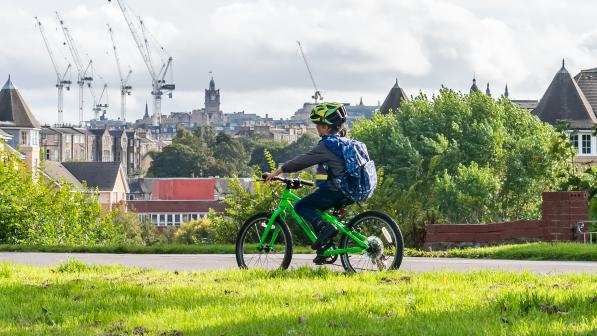What could an SNP-Greens deal mean for cycling in Scotland?

Late last week, the Scottish National Party (SNP) and the Scottish Green Party published a cooperation agreement which could bring the latter into Government and see a greening of government policy.
The agreement, or 'Shared Policy Programme' includes a raft of policy measures, including strong new commitments for active travel and for reducing climate emissions from transport.
If the agreement is ratified by the Greens' membership, it will see 10% of the transport budget being spent on cycling and active travel, something we have campaigned for for many years and was a key ask in our Manifesto for Cycling at the election. More than 3000 of you used your voice ahead of the election to tell political parties that this is important to you too.
The SNP won the Scottish election in May, but were just one vote short of having an overall majority in Parliament. As in the previous Parliament, it looked like the SNP would seek support for its policy agenda from the Greens, which boosted its seats to eight.
Through the summer, the SNP and the Greens have been negotiating the basis for a more formal agreement in order to secure Green MSP votes and a more stable government going forward.
The agreement published on Friday is the culmination of discussions between the parties and presents their joint work programme for the next five years. This week could see further developments including the Greens being offered ministerial posts.
For the Greens, securing more action on climate change has been a key priority, and the deal on the table shows they've been able to push the SNP government out of their comfort zone, including policies which go further to reduce emissions from Transport. Significantly, there are policies which boost effort on active travel in Scotland:
- Spend 10% of the transport budget on active travel by 2024/25 – the current spending is 3.5% and the SNP manifesto included a promise to reach approx. 5.5% by the end of the Parliament so this is a big step up. We called for this in our Manifesto for Cycling.
- More Safe to School initiatives, ensuring every child who lives within two miles of school is able to walk or wheel safely - as above, this was a policy we called for at the election to make neighbourhoods more attractive for cycling and people.
- 20mph speed limits on all appropriate roads in built up areas by 2025 – we campaigned for default 20mph speed limits and this process remains a possible route to greater safety.
- An online reporting system one-year pilot enabling anyone to upload camera footage of dangerous driving - we welcome this as a step in our campaign for Scotland to introduce an online reporting system to catch dangerous drivers.
- New buses, where appropriate, having space to carry bikes - at the election we called for this as a way to boost cycling options in rural areas.
- Greater commitment to establish an active freeway network for Scotland – in our manifesto we called for a blueprint for active travel to guide creation of a coherent network of cycle lanes in Scotland. The agreement improves the emphasis on planning and delivering networks.
- New road building in the future is also limited in the deal, and the parties will work together to develop options to achieve a 20% reduction in car use.
If the agreement gets the thumbs up from the Greens membership on the 28 August it will be the first time that a Green party have been involved in government, anywhere in the UK.
It will also mean that the Scottish Government’s Programme for Government, due for publication after MSPs return to Parliament after the summer recess next week, will include a work programme much greener than thought possible in May.
Members of both parties and the wider public will be analysing the deal over the coming days to see what it means for Scotland and there will be many who like and dislike what they read for all sorts of reasons.
What looks clear to me is that this is a good deal for cycling and active travel, and has the potential to kick start a cycling revolution in Scotland.





